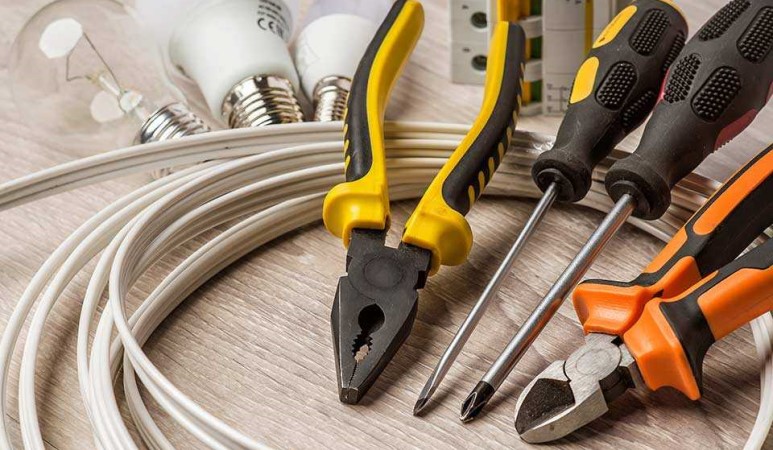
What Insurance Does A Self-Employed Electrician Need?
A self-employed electrician should always have Public Liability insurance, at a minimum. Many customers will insist their electrician holds a Public Liability policy before signing them on to work, so having a policy ahead of time is very beneficial – as well as signalling to the customer that you’re someone who takes pride in avoiding unnecessary risk. Then, depending on their situation, an electrician may want to consider Product Liability, Professional Indemnity, Tools & Equipment and Income Protection as well.
While every self-employed electrician will opt for a different package of coverages, it’s worth being aware of your options. To learn more read the NimbleFins guide to electrician insurance.
Public Liability insurance for self-employed electricians
Generally speaking, Public Liability insurance will cover you if a third-party incur damages due to your work. It’ll cover any legal fees you incur as a result of the damages and any compensation a court awards against you. It’s a staple of any quality electrician, and most wouldn’t be comfortable working without one.
Third-party is a broad term that includes several potentially impacted groups:
Customers – your toolbox bashes into customers wall in their home and they sue you to repair it
General Public – somebody trips over some wiring you’ve left exposed and is unable to work for 2 weeks
Other businesses – you fall into another electrician while working on a big project and they’re injured as a result
Public Liability offers you the peace of mind to get on with your work without having to worry about potentially expensive court cases and compensation if something were to ever go wrong. Public Liability for electricians typically costs around £89 per year, and considering a typical settlement is well over £10,000 it’s definitely not worth the risk.
You’re unlikely to be accepted onto larger projects, or taken on for any work through an agency if you don’t already have a policy (most will specify you must provide proof before taking you on), so you’ll need to have it arranged before you even apply. The combination of all of these factors makes it simply not worthwhile to operate without Electricians’ Public Liability cover.
One thing Public Liability won’t cover you for is claims made by your own employees, so if you bring anybody on board to a project you’re working on (whether full-time or part-time) then you’re legally required to hold an Employers’ Liability policy before they can begin working with you.
Tool insurance for electricians
Tool and Equipment insurance for electricians is designed to protect your trade tools in the event something goes wrong. This includes theft, accidental loss and damage by an event out of your control (fire, flood, etc.). Your insurance will cover the cost of finding an equivalent replacement for the affected tools, allowing you to quickly and efficiently resume work if something does go wrong.
While not mandatory, Tools and Equipment cover is absolutely worth considering if there are expensive tools that you couldn’t work without or could prove difficult to replace. Think about your customers’ impact if you were suddenly without your best tools – could you replace them without spending too much, and still meet the agreed deadline? If not, then a Tools policy might be for you.
While every policy is different, most electricians get around £1,000-£2,000 worth of coverage. It’ll protect almost everything you use on a day-to-day basis, from power tools and plant through to your safety goggles and mobile phone. Our research estimated that £1,000 of Tools cover would set you back around £7 monthly.
Example: You enter your secure business premises in the morning to find your toolbox has been stolen. You contact your insurer to arrange replacement costs for the tools you’ve lost.
Electrician Professional Indemnity insurance
Electricians’ Professional Indemnity insurance will protect you against any claims from customers who might be unhappy with the service or professional advice you provided. Like Public Liability, it’ll cover both the costs of any legal expenses you incur while defending yourself and any compensation a judge might ask you to pay.
Professional Indemnity is especially important to any electrician who provides their advice or designs as a service. Going to fix a blown a fuse probably wouldn’t require it, for example. Still, if you’re sorting out complex wiring, blueprinting the electrics for a new build or advising customers on how to do something, you’ll definitely want a policy, just in case something goes wrong.
It’s difficult to estimate the cost of a Professional Indemnity policy; however, a few key factors will most impact the amount you pay.
- Level of cover
- Annual turnover/largest contract size
- Location
- Claims history
Other Coverages
Product Liability will protect you if you’ve produced or sold a faulty product – say a fuse a customer has brought from you. Income Protection insurances can help cover you if you’re unable to work, perhaps due to injury or illness.


